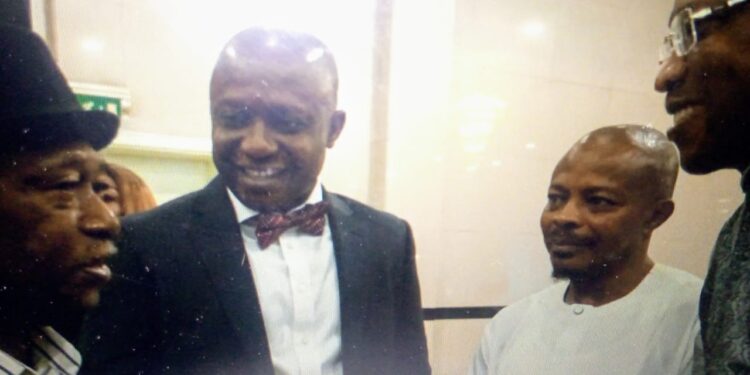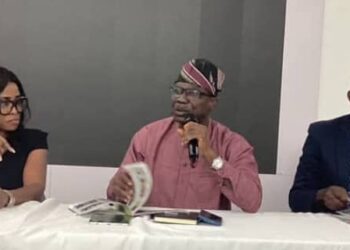The pleas from citizens to government to ease the hardship and government to the citizens to endure continue unabated with the Vice President Senator Kashim Shettima reopening fresh the plea that the citizens should endure the pains and allow government reforms policies to generate the needed growth and development of the economy.
Shettima who was represented at the Vanguard Economic Discourse by Tope Fasua, Special Adviser on Economic Affairs in the office of the Vice President, indicated that all the reform measures including removal of petroleum subsidy, foreign exchange liberation, electricity tariff increments and others were positive adjustments made to restructure the economy, and expressed confidence the reforms would herald positive change soon.
Noting that the pains were time bound he was clear that the economy will soon experience significant growth once the country overcomes the ongoing reforms and sacrifices occasioned by hard decisions taken by President Bola Tinubu’s administration.
He stated: “Positive changes will soon be evident across all economic indicators, including inflation, per capita income, Gross Domestic Product (GDP) numbers, poverty reduction, food security, and all aspects close to the hearts of our people.”
He speaks further, “It must be noted that the approach of the Bola Tinubu administration has been to take the ways and means situation head on, setting very tight time limits towards resolving them, classifying the loans properly as part of national debt, and ensuring that any new debts are properly structured. It has been a herculean task. I urge you to think about this effort, given that we have taken a path of strict discipline, total transparency, and accountability.
“Perhaps this, among other efforts, is responsible for the recent upgrades in our sovereign ratings by the world’s best rating agencies. We are on a mission to somewhere greater.
“The government of President Bola Ahmed Tinubu is tackling many of the economic issues in a decisive manner. We are certain that in a short while, every Nigerian will see clearly emerging, a new, fully energized nation, ready to face the world and to take an elevated space in the pantheon of nations.
“Everybody’s contribution to this new vista that we seek, is highly welcome. And we must banish unproductive cynicism. We urge every Nigerian – old and young alike – to view their nation positively, to notice some of positively profound changes happening around them, and to make themselves available for these new opportunities.
“Another is decisiveness in doing what may not be popular but is necessary. And as we all line up behind a great leader who embeds a great vision for our nation, we committed to the success of key reforms, chiefly around the removal of petroleum subsidies and finding a workable value for the Naira,” he stated.
Following after was the CBN Governor represented by Dr. Blaise Ijebor, the CBN’s Director Risk Management Department, he stated that the apex bank reform measures are effective, but added inflation had slipped its control because factors beyond its mandate may be driving inflation.
He said that other unaddressed structural economic issues have resulted in the continuous pressure on inflation rate. He explained that the Monetary Policy was only a part of the many parts of inflation.
He highlighted the multiple foreign exchange rate regime as one problem the bank is trying to address to tame inflation rate and assured that the various monetary policy reforms would yield good results soonest.
He stated: “When you have inflation it has many causes or many parts. One part of inflation is a monetary policy or monetary economy. You need to tame that down. But other economic issues need to be addressed and I think the government is also trying to address them.
“You know, there are structural issues, we have issues with insecurity in some food-producing areas. All of these contribute to inflation, and that makes it very difficult to just use monetary policy alone to tame inflation.” He also addressed the FX grinding impact “There are many other things he noted that were being looked into “One of the things we’re doing in that space is to make it more transparent and more market-driven”, he explained
“Over the years, one of the big problems we had and that is why inflation was intractable was because what happens is that we give the preferred sectors lower rates and you go straight to the black market and sell it and then they go and buy goods and they still sell it to you at the black market rate.
“So all they’re doing is making supernatural or super abnormal profits with no benefits to the general public. What ends up happening is that the general public is being punished twice”.
But the NACCIMA President Dele Oye shifts ground from government avoidance of whole blame for the economic woes. One major position that he said was missing was support for local businesses which he cleared was crucial to the nation’s economic growth. He added that as bad as the prior government policies were in general terms, local businesses enjoyed some privileges on forex allocation which no longer applied. He squarely held the CBN current foreign exchange policies for the drivers of hyperinflation in the country.
He said that everywhere in the world the government stands to support its own people and their businesses but the Nigerian government has not demonstrated that. His words: “Every country defends her currency. You can see what America is doing to China to slow them down, so that America can continue to prevail. You can see the way they protect their industries. Countries must defend their own. But in Nigeria, there is nothing for the Nigerian businessman”. Besides he said there is a disconnect between the Presidency, the CBN, the MDGs over the President eight point agenda, noting that the agencies execute their own policies in conflict with the administration agenda and these policies are up against each other.
On the cause of the galloping inflation in the country, Oye said, “there is hyperinflation because of forex policies and reforms. There has been significant rise in unsold goods, and these are manufactured goods. He let attendees know that because of unsold goods, most manufacturers have reverted to three days per week production.
Putting the cause of inflation squarely on government, he said, “The private sector is not the problem of inflation, we all know that. If you check, none of us has any money anymore. They have collected it through tax.
“The truth is, the biggest driver of inflation is the value of our currency. So we must make sure we stabilise our currency, which is the beginning and end of our problem”.
The chairman of the 2024 Vanguard Economic Discourse, Dr. Ayo Teriba, who is also the Chief Executive of Economic Associates, counted CBN monetary policy pointing out that its counter productive without strong foreign policy reserve
He also counters the policy of the CBN of engaging through the veil especially on the envisioned N1 trillion economy and criticised the apex bank for refusing to tell Nigerians what they are doing to ensure that Nigeria builds up its reserves that will support a trillion dollar economy.
“My only concern is the persistence of the volatility of the exchange rate; they are tightening, they are doing administrative interventions, but the big question is that we can all see that the reason exchange rate is volatile is because of the supply and policy inadequacy.
“The Central Bank, in particular the government, said loudly and clearly to banks that they should prepare to build their capital base to levels that will make them able to play in the trillion dollar economy. What I don’t hear anybody from the central bank say, is what they are doing to ensure that Nigeria also builds up reserves that will support the trillion dollar economy?
“It is a conversation that we have to move to the front burner and not coming to tighten monetary policy. Tightening monetary policy without reserve can be futile. Let us speak more about what is being done to ensure $40 billion in reserves is not adequate, even for a $30-50 billion GDP, much less for a trillion dollar GDP,” he stated.









































